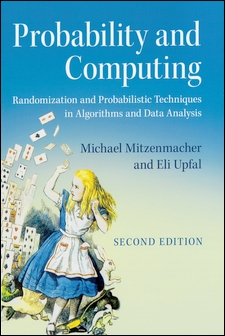書籍分類

Probability and Computing: Randomization and Probabilistic Techniques in Algorithms and Data Analysis 2/e (H)
作者:Michael Mitzenmacher, Eli Upfal
原價:NT$ 1,680
ISBN:9781107154889
版次:2
年份:2017
出版商:Cambridge University
頁數/規格:488頁/精裝單色
參考網頁:Probability and Computing 2/e
版次:2
年份:2017
出版商:Cambridge University
頁數/規格:488頁/精裝單色
參考網頁:Probability and Computing 2/e
內容介紹 目錄 作者介紹
- Description
- Contains all the background in probability needed to understand many subdisciplines of computer science
- Includes new material relevant to machine learning and big data analysis, enabling students to learn new, up-to-date techniques and applications
- Newly added chapters and sections cover the normal distribution, sample complexity, VC dimension, naïve Bayes, cuckoo hashing, power laws, and the Lovasz Local Lemma
- Many new exercises and examples, including several new programming-related exercises, provide students with excellent training in problem solving
Greatly expanded, this new edition requires only an elementary background in discrete mathematics and offers a comprehensive introduction to the role of randomization and probabilistic techniques in modern computer science. Newly added chapters and sections cover topics including normal distributions, sample complexity, VC dimension, Rademacher complexity, power laws and related distributions, cuckoo hashing, and the Lovasz Local Lemma. Material relevant to machine learning and big data analysis enables students to learn modern techniques and applications. Among the many new exercises and examples are programming-related exercises that provide students with excellent training in solving relevant problems. This book provides an indispensable teaching tool to accompany a one- or two-semester course for advanced undergraduate students in computer science and applied mathematics.



